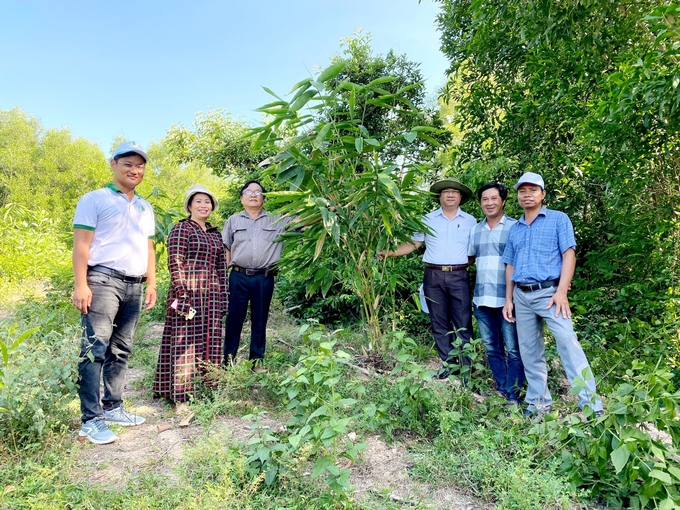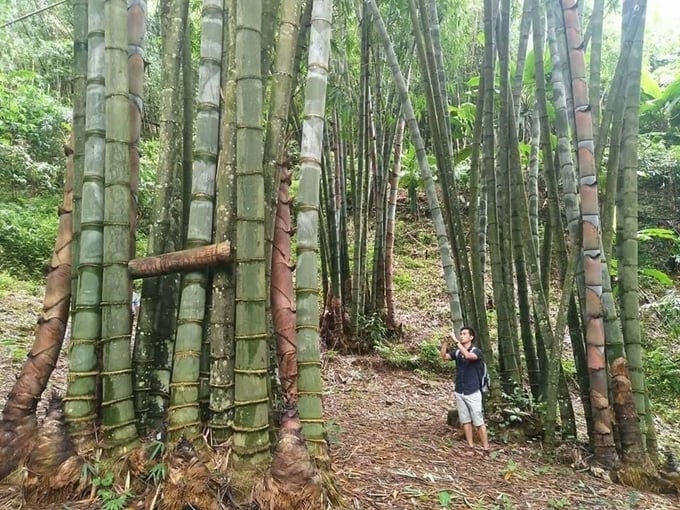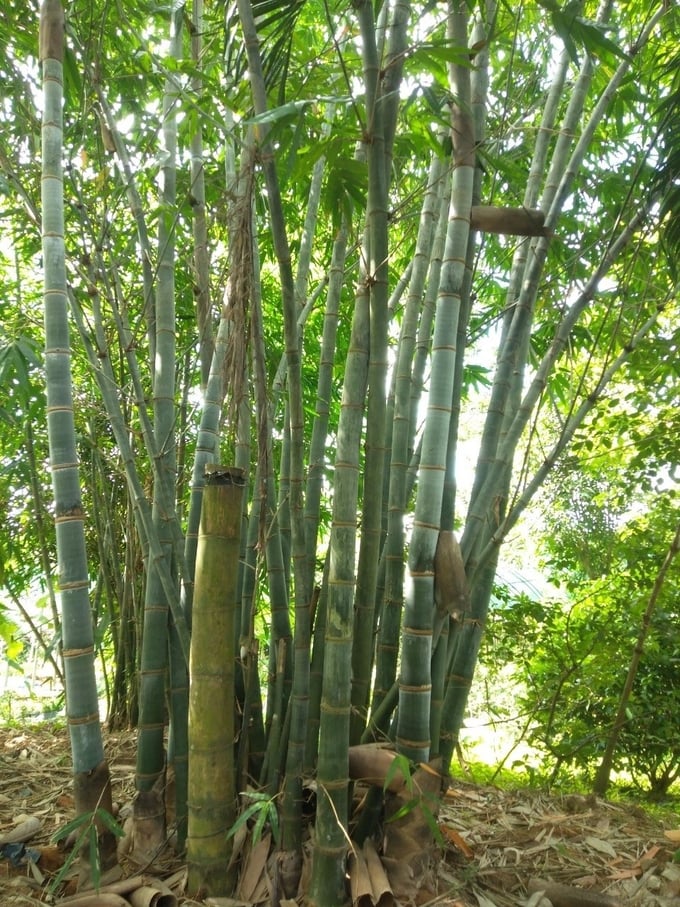November 26, 2025 | 17:00 GMT +7
November 26, 2025 | 17:00 GMT +7
Hotline: 0913.378.918
November 26, 2025 | 17:00 GMT +7
Hotline: 0913.378.918

The model of growing biomass bamboo in Duc Pho town (Quang Ngai) has started to give positive signals.
Quang Ngai province is a locality with a large area of acacia plantations in the Central region, with over 225,000 hectares, mainly concentrated in mountainous districts such as Tra Bong, Son Ha, Son Tay, Ba To ... Over the years, acacia has contributed significantly to the economic development of localities, helping to eliminate hunger and reduce poverty.
However, today, when climate conditions are increasingly changing negatively, people's cultivation of acacia trees is also greatly affected. Quang Ngai is located in the central coastal area. Each year, there are usually 3 to 4 storms that directly affect, resulting in heavy damage to many acacia areas.
In 2020, storm No. 9 caused nearly 100,000 hectares of acacia forest in Quang Ngai to fall. Of the damaged forest area, 45,000 hectares can be recovered, and about 30% of hectares of acacia trees from 2-4 years old are lost.
Faced with this fact, it is necessary to find suitable crops for conversion with high economic value and minimize the risks caused by natural disasters. This is also the goal of EcoBambu Bamboo Joint Stock Company (address at 126 Le Trung Dinh, Nguyen Nghiem Ward, Quang Ngai City, Quang Ngai Province).
EcoBambu Bamboo Joint Stock Company has built a program to restore forest ecosystems from bamboo to develop economic value chains.
According to Lam Tan Tai, Director of EcoBambu Bamboo Joint Stock Company, about 1,400 bamboo species of 90 varieties are distributed in many countries with an area of more than 22 million hectares. It is estimated that there are more than 300 product lines made from bamboo. Over the past 20 years, the total annual trade of this tree has reached between $US1.7 and US$2.5 billion.

Hitung bamboo variety is a high-quality wood-based bamboo variety that meets production and export needs.
However, the number of biomass bamboo varieties for timber is relatively modest, only calculated at the fingertips. In Vietnam, there is an area of bamboo growing up to 1.6 million hectares (accounting for about 11% of the national forest area, and the planted forest area accounts for about 5%). Still, the bamboo varieties in our country do not meet the national standards to get timber for export.
Vietnam's climate and soil conditions are very suitable for biomass bamboo varieties, including the bamboo variety whose scientific name is Dendrocalamus Asper "Hitung" (referred to as Hitung bamboo). From purebred seed sources taken from hatcheries in Thailand, the company has conducted trial planting in some localities such as Binh Duong, Ho Chi Minh City... The results show that the plants grow and develop equally well.
Compared with acacia - a commonly grown tree in production forests today, biomass bamboo brings many times the higher economic value and has other advantages.
Mr. Lam Tan Tai, director of EcoBambu Bamboo Joint Stock Company, said that at the moment, the investment value for 1 hectare of Hitung bamboo is about VND 80 million (including seed money, care, and fertilizer). Calculated in the shortest cycle of 20 years, bamboo trees continuously regenerate and do not need to be replanted. Every 15 consecutive years, there are exploited products, bringing people more than VND 2 billion in profit.
Meanwhile, acacia trees will take up to 4 times the same investment, costing about VND 70 million. The profit was just over VND 500 million.

Hitung bamboo grown in Cu Chi (Ho Chi Minh City) shows good adaptation to climate and soil conditions in Vietnam.
In addition to its economic value, bamboo has many advantages in protecting the ecological environment and adapting to climate change. Accordingly, bamboo absorbs four times more CO2 and releases 35% more oxygen into the atmosphere than comparable trees, helping to improve microclimate air quality.
With a cycle lasting up to tens of years, a robust root system firmly clinging to the soil and spreading over a large area of land, bamboo will keep the soil from landslides when it is flooded and form a barrier to reduce the intensity of storm winds. Trees can regenerate very quickly without replanting when broken due to high winds. Unlike acacia, after 5-7 years of exploitation, there will be a period when it becomes bare land, bare hills, and the soil will be quickly eroded and washed away.
The Hitung bamboo variety selected by EcoBambu Eco-Bamboo Joint Stock Company is a large-sized variety, with a diameter of 15-30cm at the mature stage, a height of about 15-30m, and a body thickness of 2.5-3cm.
The wood of the tree is appreciated for its high quality. Almost all parts of the tree are used to make products in many fields, from handicrafts to industry, food, pharmaceuticals, and cosmetics.
In Quang Ngai, EcoBambu Bamboo Joint Stock Company has built 10ha of bamboo material areas for timber in Duc Pho town. This area has been nine months old and is in the growth and development phase.
"In the following years, EcoBambu Bamboo Joint Stock Company will gradually expand to many areas in Quang Ngai province and neighboring provinces such as Quang Nam and Binh Dinh. Once there is a large raw material area, it will be eligible to set up a processing factory in the central region. From there, helping people improve the forest's economic efficiency", said Mr. Lam Tan Tai.
Translated by Ha Phuc

(VAN) China’s cooking oil is suddenly flooding into India. It all comes down to a soybean surplus that Beijing doesn’t quite know what to do with.

(VAN) An Giang promotes supply-demand connections, standardizes quality and builds value chains, creating a foundation for sustainable bird’s nest development and aiming to expand exports.
/2025/11/24/5339-4-nongnghiep-075331.jpg)
(VAN) Recently, the conference on 'Sustainable Fisheries Linkage Chain - Tilapia for Export' took place in Tien Hai commune, Hung Yen province.
/2025/11/21/4309-2-153400_128.jpg)
(VAN) Green and low-emission rice is paving the way for Vietnamese rice to enter high-end markets, marking the beginning of a transformation journey toward greening and elevating the national rice brand.

(VAN) ‘Right to Win’ outlines a national action plan that shapes a new vision for Viet Nam’s agriculture in an era of renewal and global integration.

(VAN) Lam Dong’s farmed sturgeon output this year is expected to reach 2,300 tons, worth VND 450 billion, affirming the brand’s position on the market.

(VAN) A surge in Ukrainian egg exports, largely driven by soaring sales to the UK over the last few years, has notably pushed up egg prices on the domestic market.